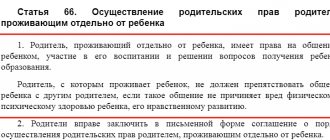The law explicitly states that a parent living with a minor cannot deprive the other parent of the right to communicate with the child after a divorce at their discretion. The exception is when a parent living separately harms a young child, i.e. harms his mental and physical health or moral development. Moreover, the presence of harm must be determined by the court.
Therefore, if there are no grounds that provide the opportunity to prohibit or restrict one of the parents through the court from seeing the child, there is a need to regulate relations between former spouses after a divorce or between former cohabitants after separation in the area of communication with a minor. This can be achieved according to current Russian legislation in 2 ways:
- According to the agreement on the exercise of parental rights.
- Through the court.
Legal regulation of communication with a child after divorce
By agreement of the parties
In order to record in writing the schedule of meetings with a minor and other circumstances relevant to his upbringing, the ex-wife and husband, by mutual consent, can draw up a document called an agreement on the procedure for the exercise of parental rights. The undeniable advantages of an agreement over litigation are:
- Speed of conclusion. As a rule, drawing up and signing an agreement is a matter of several days. In contrast, consideration of the claim by the court will require at least one month, and then only on the condition that the decision is made in one meeting. Additionally, it is necessary to take into account one more month, which must pass from the moment the decision is drawn up in its final form until the court’s act is given legal force.
- No intermediaries. The father and mother have the legal right to independently determine where and when the child and the estranged parent can meet. To do this, you do not need to involve third parties, for example, a notary.
- Free. The law recognizes a simple written form of such an agreement, so parents have the opportunity to save on notary services.
- Flexibility. If life circumstances change, for example, a deterioration in the health of a minor, a change in the work schedule of the mother or father, the parties can easily change previously reached agreements.
When writing an agreement, the main attention should be paid to the health, taking into account the daily routine, interests and desires of a young child.
Based on them, parents discuss and indicate in the document the following:
- A place for communication.
- Times at which meetings can take place.
- The possibility or impossibility of spending a vacation or vacation with a child.
- Whether or not the parent who permanently lives with the child is allowed to be present at these meetings.
- Some prohibitions related, for example, to the health status of a minor. For example, if a mother has a son who suffers from an allergy to citrus fruits, then she can demand that the father take responsibility in writing for not treating the child to oranges, tangerines and other citrus fruits during meetings.
- It is advisable to indicate in the agreement that the minor, who is ten years old at the time of drawing up the document, agrees with the parental agreements.
As a sample for drawing up an agreement, you can use the document available at this link.
Judicially
If the parents were unable to peacefully agree on a time to meet with their young children, then the injured party in this case, as a rule, is the parent who lives separately from the children. In the vast majority of cases these are fathers.
Usually in such situations, ex-wives completely block fathers’ opportunities for communication and interaction with their children, and also turn them against their ex-husbands. From the point of view of the Family Code, such behavior is unacceptable, and if desired, fathers can seek restoration of the right to communicate and raise minors through the court and, with proper preparation for the trial, win this right for themselves.
Before initiating legal proceedings, it is important to consider the following nuances:
- Such disputes are subject to jurisdiction only by district courts.
- The participation of a third party, which is the guardianship institution, is required.
- The guardianship authority must submit to the court a conclusion expressing its point of view on the dispute between the parents and an act of inspection of the residential real estate of the defendant and the plaintiff.
- If the minor is over ten years old, then the court should interview him and be guided by the child’s opinion when making a decision on the case. The interview must be carried out by a judge in the absence of interested parties who can put pressure on him, so parents are removed from the courtroom during the interview. Also, this procedure must take place in the presence of a teacher, psychologist or representative from the guardianship institution.
According to the rules of jurisdiction, disputes about determining the schedule of communication with a minor are subject to the general requirements established by law. These requirements are shown in the table.
| Type of jurisdiction | A comment |
| At the place of registration or place of actual residence of the defendant | In accordance with this rule, most lawsuits are filed in Russia. It is established by default by law. |
| Under contract | The parties have the right to independently agree on in which locality and which district court their disputes regarding children will be resolved. |
The statement of claim must include the following information:
- At the top is written the name of the judicial authority, its address and zip code, as well as information about the plaintiff and defendant, allowing them to be identified (full name, place of residence or actual stay, zip code, telephone number, e-mail or other contact information).
- In the descriptive part, the plaintiff indicates: Information about the marriage with the defendant (when it was concluded and in which registry office and when it was dissolved).
- Information about young children (full name and date of birth).
- Circumstances forcing him to go to court, for example, the defendant’s refusal to discuss the terms of the agreement fixing the schedule of meetings with the minor; banning the minor from communicating with the plaintiff; refusal to fulfill the terms of the agreement, etc.
- The meeting schedule and level of participation in the upbringing of a young child suits him.
- Evidence that supports the plaintiff's claims. These include, for example, a psychologist’s conclusion about the presence of a strong emotional attachment of a minor to the plaintiff; information about the absence of alimony debts; characteristics from the employer, educators and teachers; having your own comfortable housing; no criminal record according to a certificate from the Ministry of Internal Affairs; documents from medical institutions confirming the absence of HIV, syphilis, tuberculosis, and infectious diseases; the plaintiff’s work schedule, consistent with his proposed meeting schedule.
- Links to laws and judicial acts.
- List of the plaintiff's claims.
A sample statement of claim to determine a schedule of meetings with a minor can be downloaded here.
Lawyer's answers to frequently asked questions
Can a court refuse to communicate with a child?
Yes, if communication with a parent living separately violates the interests/rights of the child. In order to eliminate restrictions and prohibitions, it is necessary to eliminate the identified shortcomings and judicial observations, and then re-apply to the court with a statement of claim.
What to do if the mother forbids communicating with the child and prevents this in every possible way?
The woman faces legal liability under the articles of the Administrative Code. The father should collect evidence confirming the violation of the ability to communicate with the children, and then send a statement of claim to the court complaining about the actions of the ex-wife. The judge holds the mother accountable and warns that if the established rules of communication are violated again, the child may be transferred to the care of the father.
Is it possible to oblige the father to communicate with the child?
No, it's a parent's right. According to the RF IC, children also have the right to communicate with their father, but forced communication can lead to negative consequences for the emotional and psychological development of minors.
Is it possible to set a schedule for a child’s communication with his grandparents?
Yes. Communication with other relatives can also fit into a schedule based on the child’s busy schedule. The main thing is to allow at least periodic meetings and visits.
Can I deprive a father of parental rights for non-participation in the child's life?
Yes. This is one of the grounds provided for by the Family Code. But it is necessary to confirm that the parent had the opportunity and there were attempts to establish communication between the mother and children, but the father was categorically against this.
Circumstances for determining the order of communication with the child
The main criteria that judges use when determining the time of meetings between a parent living separately and a minor child are:
- Age of the child. The younger he (she) is, the more likely the court is to limit the time of communication with him to a few hours a month.
- The health status of the minor. If a child is disabled or suffers from any chronic illness, then the courts often do not allow the child to meet with a parent living separately from him, outside the minor’s place of residence and in the absence of the other parent.
- Degree of attachment to the non-custodial parent. The courts interpret this criterion as follows: the more time has passed since the last meeting, the more the child’s attachment to the plaintiff has weakened. Therefore, for the first few months (usually from 3 months to six months), judges limit the time for communication, justifying their decision by the fact that at first long meetings can cause psychological trauma to the minor.
The review of judicial practice systematized by the Supreme Court of Russia indicates additional criteria identified by Russian courts during the proceedings of similar cases. They are indicated and explained in the table.
| Criteria for evaluation | A comment |
| Availability of comfortable housing for the plaintiff if he plans to take the child with him for the time allocated for communication. | The court is obliged to make sure that the plaintiff’s home has conditions for the upbringing and development of the minor and that as a result of their communication the child will not suffer psychological trauma or damage to his moral development. At the direction of the judge, the guardianship institutions conduct an inspection of the plaintiff’s residential property to determine the availability of a play area for the child, a place to sleep, etc. and formalize the results in the form of an act. |
| Daily routine for a minor | It is determined based on surveys of the child and the parent living with him. If the child’s regime does not coincide with the plaintiff’s requirements, for example, the plaintiff asks for meetings every Saturday from 13 to 16 hours, and at this time the child sleeps, then the court will most likely refuse to satisfy the plaintiff’s claims and set a time for meetings, for example, in the morning or evening. |
| The distance of the plaintiff’s house from the house where the young child lives | This criterion is assessed by the court based on the answer to the following questions: is it worth or not to allow the plaintiff to take the child with him while communicating with him, will this not harm the child’s health? This issue is decided by each judge individually, and precise recommendations cannot be given here. The law does not set a limit on the distance between the houses of the plaintiff and the child, so if for one judge 5 kilometers is too far, then for another 30 kilometers is a completely normal distance. |
List of documents for filing a claim
Before filing documents, you must prepare copies in advance for each participant in the trial and one copy of all papers for the judge.
With a claim to determine a schedule of communication with a child, the following documents are usually provided:
- Copies of the statement of claim for the court and all participants in the proceedings.
- Divorce certificate from the registry office.
- Documents for children, if the plaintiff has them, for example, birth certificates.
- Agreement on the procedure for communicating with the child. It is necessary if its terms are disputed.
- Documents for residential real estate, for example, a certificate of ownership.
- Evidence that allows one to assert that the child has an emotional attachment, for example, a psychologist’s report.
- Information about working hours, business trips.
- Proof of earnings, for example, a tax return or 2-NDFL certificate.
- Information indicating that the plaintiff tried to reach an agreement with the defendant, for example, correspondence on social networks or instant messengers, recording telephone conversations, etc.
- Positive characteristics from neighbors, teachers, employer.
Nuances
To more fully understand the features of establishing a procedure for communicating with a child after a divorce, it is necessary to take into account a number of important points:
- To cancel or change the order of meetings with children, which is established in accordance with the claim, you will have to re-apply to the court, attaching documents substantiating the requirements.
- Representatives of guardianship and trusteeship authorities can submit an application for restriction of parents' rights when it is revealed that harm has been caused to a child in a psychological or physical sense.
- A minor child, upon reaching 10 years of age, has the right to independently apply for a refusal to communicate with one of the parents after the dissolution of the marriage. The request can be submitted by the child's legal representative either to the court or to the guardianship and trusteeship authorities.
- In order to achieve loyal conditions and procedures for spending time with children after a divorce, it is necessary to obtain not only a positive reference from the employer, but also the words of relatives, neighbors and recommendations from the guardianship and trusteeship authorities.
- When drawing up an agreement defining the rules and procedure for meetings with a child after the spouses divorce, one must avoid indicating positions that violate the interests of minor citizens. For example, if children are 10 years old or older, they have the right to express their own opinions. If you ignore the child’s preferences, if this fact is revealed, the agreement will be considered void.
As a result, communication with children after divorce depends on many circumstances. The simplest and most recommended option for ex-spouses to determine the order of meetings with the child is to peacefully reach an agreement on the rules of interaction with the joint child.
Comments Showing 0 of 0
Arbitrage practice
The dispute was considered by the Ust-Dzhegutinsky District Court of the Karachay-Cherkess Republic in July 2021.
The father submitted a statement to the judge asking him to determine the frequency of communication with his little son, because his mother was preventing them from meeting. The plaintiff stated that she takes the mobile phones for her son, which he gave to his former partner, for herself. The defendant allows us to talk to the child only after the plaintiff gives her money.
Previously, he tried to negotiate peacefully with his son’s mother and conclude an agreement, but his attempts were unsuccessful. Therefore, he was forced to file a claim. The father's demands were as follows:
- Communication via cell phone daily from six to seven o'clock in the evening.
- Any fourth week of each month from six o'clock on Friday evening to eight o'clock on Sunday evening, the father may meet with the minor in housing owned by the plaintiff. The defendant cannot attend these meetings.
- Every year from the sixth of July to the sixth of August, a joint vacation without the presence of the former partner.
The defendant did not agree with the plaintiff and explained that she agreed to communication between the plaintiff and her son, but only in her presence.
A representative from the guardianship institution told the judge that she did not find any grounds that could be the reason for the refusal of the plaintiff.
The court, having studied the materials and listened to the arguments of the parties, came to the conclusion: the plaintiff’s claims must be satisfied in full due to the following reasons:
- Although the plaintiff and defendant did not enter into an official marriage or live together, the father pays money to support his son. Moreover, the defendant demanded alimony in court, so the judicial authority came to the conclusion that the father’s actions were voluntary.
- The defendant did not seek to resolve the conflict through extrajudicial means and told the representative from the guardianship authority that the dispute between her and the plaintiff could not be resolved in any way other than judicial proceedings.
- Based on the results of an examination by psychologists of the child, it was revealed that the son gives preference to his mother, but experiences positive emotions towards his father. No negative experiences associated with the father were found.
- From the act of examining the housing of the defendant and the plaintiff, it follows that their residential property meets the requirements established by law and is suitable for a minor to stay there.
- When the boy lived with his dad, he attended a private kindergarten, which was paid for by the plaintiff. Thus, the plaintiff showed his concern for his son and his development.
- The defendant did not provide evidence confirming that the plaintiff negatively affects the psyche or morality of the child. In turn, she herself interferes with the exercise of the plaintiff’s legal parental rights.
Regulatory framework
| List of legislative acts | List of articles |
| Family Code of Russia | Article 57 – the opportunity for a young child to express his opinion when mom and dad discuss family issues. Article 61 proclaims the equality of mothers and fathers in rights and responsibilities in raising young children. Article 66 – rules according to which mothers and fathers must resolve disagreements regarding communication with a small child. Article 78 – the mandatory participation of the guardianship institution in litigation regarding the coordination of the schedule of meetings between a small child and parents. |
| Civil Procedure Code of Russia | Article 24 – family matters within the jurisdiction of the district court. Article 28 is the rule on the jurisdiction of family disputes at the defendant’s place of residence. Article 32 – the possibility of establishing contractual jurisdiction. Article 131 – components of the statement of claim. Article 132 – documents attached to the plaintiff’s application. |
| Tax Code of Russia (part 2) | 333.36 article – exemption of plaintiffs from paying state fees when filing claims aimed at changing participation in educational measures or the schedule of meetings of a parent who does not live with the child. |
Rights and responsibilities of parents
Chapter 12 of the IC of Russia establishes a complete list of the rights and responsibilities of parents in relation to their children. In particular, the following principles must be taken into account:
- mother and father have equal rights and responsibilities;
- termination of rights is carried out in the event of deprivation of parental rights in court;
- possible limitation of powers;
- After eliminating the violations, restoration of paternity/maternity is allowed.
This list is valid for the biological mother and father, as well as adoptive parents after the court decision on adoption has entered into legal force.
See also:
- What rights do parents have to their children after divorce?
- How to change a child's last name?






